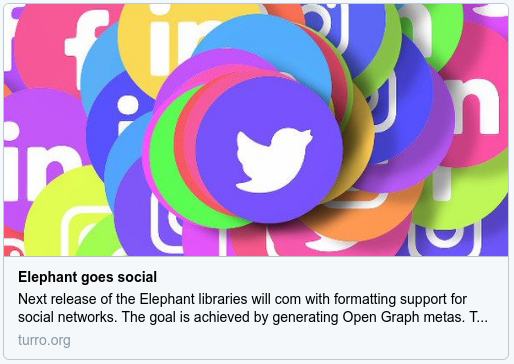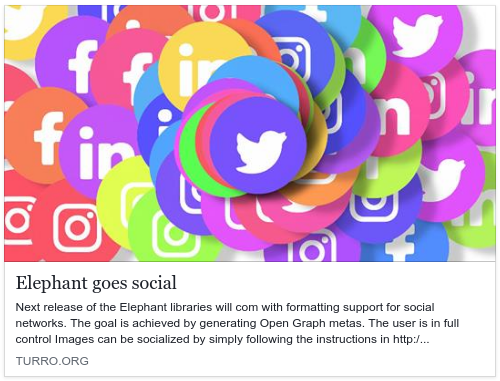El servei BaaS rep una nova actualització aquest mes de maig
No ha donat temps de provar els avantatges del Java SE 9 que Oracle ja ha llençat la nova Java Standard Edition 10. Això junt amb les noves característiques del servidor d'aplicacions, complint amb l'especificació Servlet 4.0 de la darrera versió Java Enterprise Edition 8. Emocionant tot plegat.
El servei BaaS s'actualitzarà en breu amb aquestes darreres versions. Ja es va preparar aquest Nadal passat, quan s'actualitzaren totes les llibreries del servei, i serà una realitat aquest mes de maig a tots els serveis BaaS.
De quins avantatges es nodrirà el servei?
De tots els avantatges propis de la màquina virtual, destacant potser el Parallel Full Garbage Collector. De les millores en el codi compilat, operacions concurrents i execucions en paral·lel.
Però potser la part més vistosa són les millores en les keystores per a certificats digitals i l'encriptació TLS. Aquestes es propaguen fins el servidor d'aplicacions, permetent allotjar certificats en serveis BaaS compartits. Mai haurà estat tan fàcil tenir un domini segur amb https.
Tinc que fer alguna cosa?
Res. El servei s'actualitzarà un cop hagi passat la fase beta en producció. Els clouds s'actualitzaran i es re-iniciaran en horaris nocturns i en cap de setmana.
Si tens algun dubte respecte l'actualització o els certificats digitals pel teu domini, contacta suport@turro.org.
Elephant goes social

Next release of the Elephant libraries will come with formatting support for social networks. The goal is achieved by generating Open Graph metas.
The user is in full control
Images can be socialized by simply following the instructions in http://www.turro.org/docs/elephant/components/social. For publications, images will be selected using the conventions described in http://www.turro.org/docs/brightside/publications/conventions.
How does it look like?

Twitter example

Whatsapp example

Facebook example
Google Drive canvia el model Mac/PC pel File Stream
Google Drive per a Mac/PC es desactiva definitivament el 12 de maig de 2018. Tots els usuaris que el facin servir com eina de sincronització hauran de migrar a File Stream de Drive.
File Stream de Drive és una nova aplicació per a Mac o PC que et permet accedir a tots els teus arxius de Google Drive des de l'ordinador al mateix temps que s'estalvia espai en disc i es redueix el temps de sincronització.
Com funciona?
Amb File Stream de Drive pots:
- Veure ràpidament tots els teus arxius de Google Drive a Finder o en l'Explorador de Windows (incloses les unitats d'equip).
- Explorar i organitzar els arxius de Google Drive sense haver de descarregar-los tots a l'ordinador.
- Triar quins arxius o carpetes voleu que estiguin disponibles fora de línia.
- Obrir arxius en aplicacions com Microsoft Office i Adobe Photoshop.
Què he de fer per començar?
Visita el Centre d'Ajuda de Drive per instal·lar File Stream de Drive i començar a utilitzar aquesta aplicació.
Elephant's new features for SEO
The new Elephant version comes with some new features that will make life easier for SEO. The most relevant are:
Publication URLs
Previous to Elephant URL-as-parameter, BrightSide Publication URLs were generated using the publication ID. Something like ?item=n. This has been override by easy-to-read URLs. Something like /elephants-new-features-for-seo, which happens to be the URL for this one you're now reading.
Currently, the URLs are auto-generated when the publication is saved. And wont change in future savings. The new system is backward compatible with the previous one.
The URL-as-parameter generates when publication entities have their own context defined. See Sitemap.
No follow property for some links
The links affected (but not exclusively) are:
- Authentication required links.
- Print version links.
- Pagination links.
- Cloud tag links.
- Category links.
Auto-generated sitemap
Elephant generates a sitemap from all its contexts. Also, requires BrightSide modules to provide relevant URLs. See Sitemap for more information.
Detect the charset in Java strings
Before start, I would like to mention Apache Tika and juniversalchardet. Tika is a full-featured file type detection library and, because so much features, takes a big amount of dependencies. I haven't tried juniversalchardet for does not detect ISO-8859-1, which is the reason I needed charset detection.
Since none well suited my problem, I decided to detect charsets myself and, once results were in production, share it with anyone else. Hope you like it ![]()
Why charset detection?
Anyone developing web applications with data inputs and third-party frameworks, with a different charset than UTF-8, might have encountered the need to auto-detect charset. Guessing the source of the input on utility classes, or passing the charset along among methods, doesn't seem to be the right way and isn't always possible.
Changing the string charset
We'll need a convert method, in order to change the string charset. The most simple way would be using String supplied methods. Something like:
public String convert(String value, String fromEncoding, String toEncoding) { return new String(value.getBytes(fromEncoding), toEncoding); }
The problem remains, though. The variable fromEncoding isn't always known.
Charset guessing
Guessing? Well, let's be clear, we are guessing. Also taking some premises that might be not true. For instance, we probe using UTF-8 against a set of expected charsets. The good thing about it is that we know the elements at play and can change them at will.
The approach is very simple: if I do change the string from the expected charset to UTF-8 and then back from UTF-8 to the expected charset, shouldn't be the resulting string exactly the same than the original one?
Let's put this at work:
public static String charset(String value, String charsets[]) { String probe = StandardCharsets.UTF_8.name(); for(String c : charsets) { Charset charset = Charset.forName(c); if(charset != null) { if(value.equals(convert(convert(value, charset.name(), probe), probe, charset.name()))) { return c; } } } return StandardCharsets.UTF_8.name(); }
A possible call to the charset() method would be:
String detectedCharset = charset(value, new String[] { "ISO-8859-1", "UTF-8" });
As I said, the approach uses the premise that UTF-8 will behave well on all transformations and that there is a reduced set of expected charsets. I haven't tried probing the whole Charset.availableCharsets(). In case you do and find a better way, please let me know.





